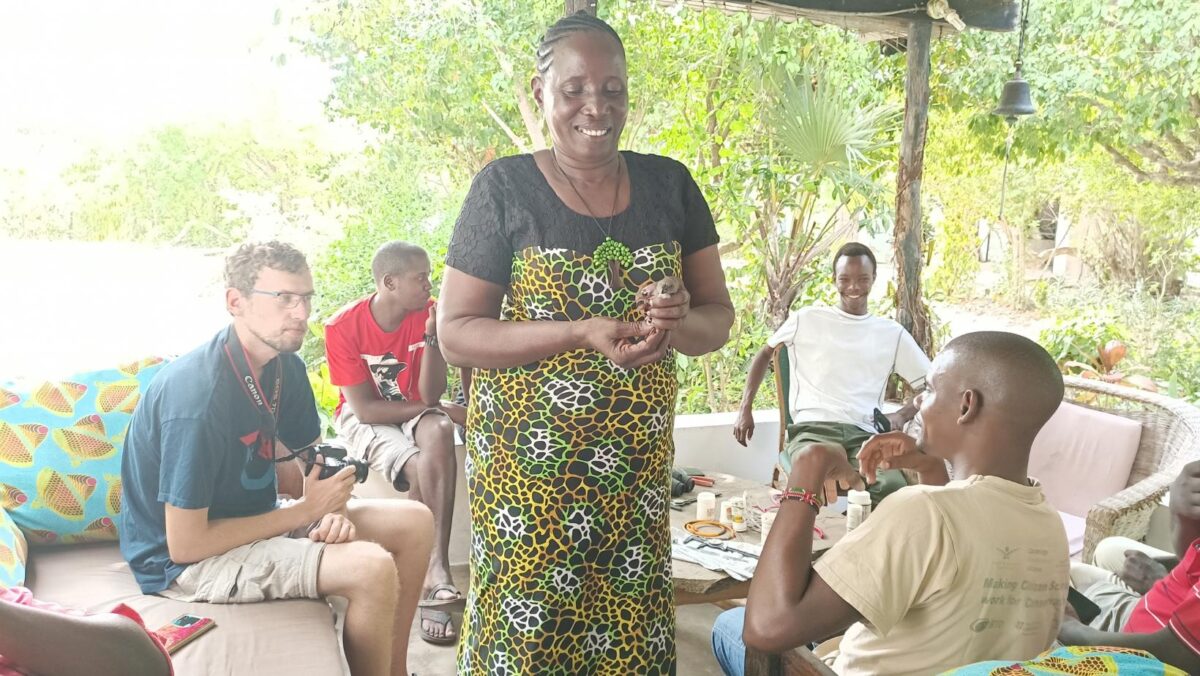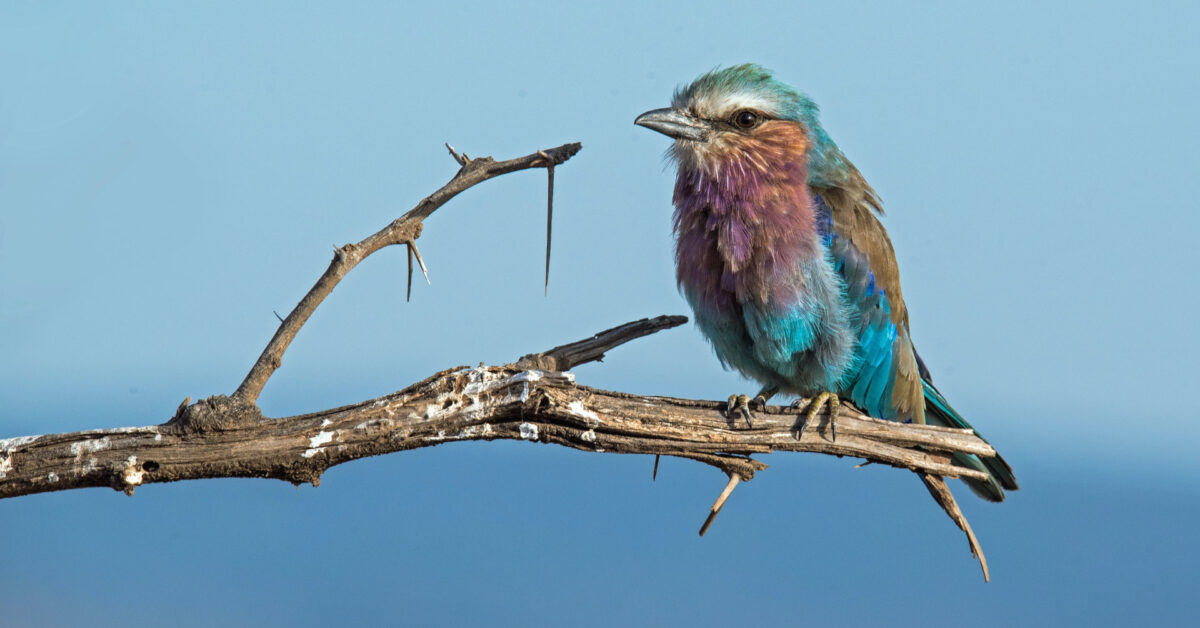My name is Juliet Anyanzwa and I take care of administration support for Eva Jefa, our Head of Operations and the Word Forest Team at our Permaculture Teaching Centre in Garashi, Kenya. I would like to share my report about some training about trees and the environment our team did recently.
Everything we’re able to learn about tree planting, what is working well and what isn’t, helps us stay one step ahead of climate chaos and we really need that knowledge. We’re grateful to all the supporters of Word Forest for enabling us to do this. Thank you from us all.
The evening before the training began was such a thrilling and wonderful night. I’ve never felt both anxious and excited at the same time. This was the first external training workshop I had attended for Word Forest and I wanted to be fully prepared. I made sure that I packed my bag with all the stuff I would require before leaving for the sessions.
Eva had already organised a means of transport the day before and the car was parked outside ready for the journey. It felt like a long night but eventually it was 3.00am, time to get moving. Eva and l got up to prepare ourselves. By 4.00am, Eric our Plants Manager, Charles our Community Liaison Officer, Eva and l, began our journey to collect Esther from her shamba. Esther is the Facilitator of our women’s empowerment group, the Mothers of the Forest.
Once we were all assembled, we headed to the A Rocha Kenya offices in the Arabuko Sokoke Forest for a two day workshop focused mostly on tree propagation but also including knowledge on marine and terrestrial life and explaining how climate chaos is affecting everything in the environment. A Rocha Kenya is a Christian based, cross cultural, community outreach group whose mission it is to conserve and restore threatened habitats and biodiversity through research, environmental action, advocacy and community empowerment.
During our two hour drive, we were all extremely happy. I could see and enjoy the scenery outside. The trees and electric poles seemed to be whooshing back as if they were joined together. I thought about the learning journey that was ahead for us all. We arrived at A Rocha Kenya at 7am and the venue was a true picture of eco-tourism. Their hospitality was truly amazing.
At around 7.15am, Mr. Alex arrived, his specialty is birds. He explained we were about to do a session on bird ringing and he told us why it mattered that we kept good records. I felt it was amazing but at the beginning I could not quite understand what birds had to do with climate chaos. As we continued and he explained about wildlife decline and species loss, I understood more clearly that climate chaos affects each and everything under the sun. Of course, we need all the creatures on our planet to thrive for us to have a healthy and balanced world for wildlife and humans.

We set off on a nature trail and Mr Alex showed us exactly what bird ringing is. It’s a process whereby a bird is captured and measurements of the bill, head and features are recorded. Mist nets were placed in different areas to capture the birds. A mist net is a very fine net that is set up to catch birds in flight. After the birds have been caught, they are carefully handled and taken for the ringing. The birds are ringed with an identifying tag according to the size of the legs. The birds with bigger legs get larger rings and so on. After all the statistics have been recorded the bird is released. The ring’s numbers are unique, making it easy to identify where the bird is from and that gives us very important data about migration too.
In a later session, we also learnt about the negative impacts of climate change on marine life. Corals and guitar sharks are but a few of the local marine life species that are endangered. Rising sea temperatures are being felt here in Kenya due to global heating and that poses great danger as corals play a fundamental role in protecting coastlines from storms and erosions. They also act as critical habitation space for millions of different species of fish, mammals, crustaceans and more. Coral reefs support healthy ocean food webs. They are a fundamental part of what’s needed to make the planet well.
The guitar shark, also known as bowmouth guitarfish, is edging toward extinction due to the rising demand in the Asian fin trade whilst the meat is sold for consumption. Pollution in the sea from human activities is a major contributor to their decline. A Rocha Kenya in partnership with Kenya Marine and Fisheries has launched a monitoring system known as BRUV (baited remote underwater video) whereby a camera is placed under water to monitor these endangered species. They hope to keep track of what’s happening to a wide variety of underwater species.
In later sessions back in the forest, we learned that increased ultraviolet radiation which is caused by global heating has also immensely affected the ecosystem. The elephant shrew, only found in the nearby Dakacha Woodland Forest about 32 km from our HQ, is among the endangered species found in that location, but there are others in grave danger at that location, including the Clarke’s weaver bird.
Our session on plant phenology was really fascinating. Plant phenology is the recording of the health, growth, genus, species, number of surviving trees and maturity of the tree when it actually starts producing seeds. A Rocha Kenya also taught us about farming in what they call God’s way, the natural way of farming without use of pesticides and chemicals, as they are harmful to the environment.

We all took a trip to Mida in Watamu near the coast and did workshops at the A Rocha Kenya tree nursery. We learnt how to propagate a range of both indigenous and exotic species. We found out that germination is variant depending on the species and some take far longer than others. We picked up lots of new tips including the fact that some seeds have to be soaked to reduce the dormant period thus quickening germination. The sessions at the nursery were very valuable to us indeed.
We also visited the Sabaki Kiboko Sanctuary, which actually took place on the International Wetland Day, the 2nd February. There was a ceremony graced by the Deputy Governor Hon. Flora Mbetsa who was the chief guest and there were other stakeholders such as Nature Kenya, the Kenyan Wildlife Service, some local schools and people from nearby communities. The Governor was urged to ensure the local administration instilled what was highlighted and discussed by all the stakeholders. Administrations all over the world need to lead by example when it comes to the environment. After the speeches, we all participated in a mangrove planting exercise, which will help to conserve the ecosystems in this area very much indeed.
My concluding thoughts for the training we did are that it was incredibly valuable in many, many ways. The knowledge will help us make better informed decisions about what we plant and where we plant. It was also very good to be amongst people who understand the importance of doing tree planting and tree growing, properly. We cannot simply throw seeds in the ground and hope for the best. We have to nurture them and most of all, we need to teach the community how best to do that.
This is something Word Forest does wholeheartedly and we’re looking forward to the construction of more classrooms at our Permaculture Teaching Centre so we can extend our reach of community learning.
I highly appreciate Word Forest for this insightful opportunity that has widened my scope of knowledge on environmental and marine worlds. This was an eye opener and it was fun filled too.
Juliet Anyanzwa and The Kenyan Team





